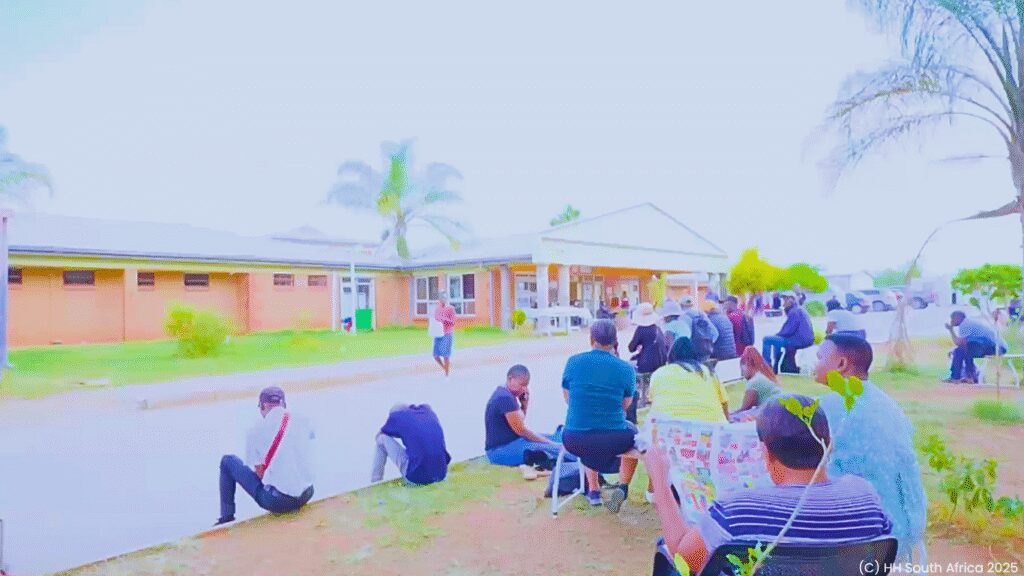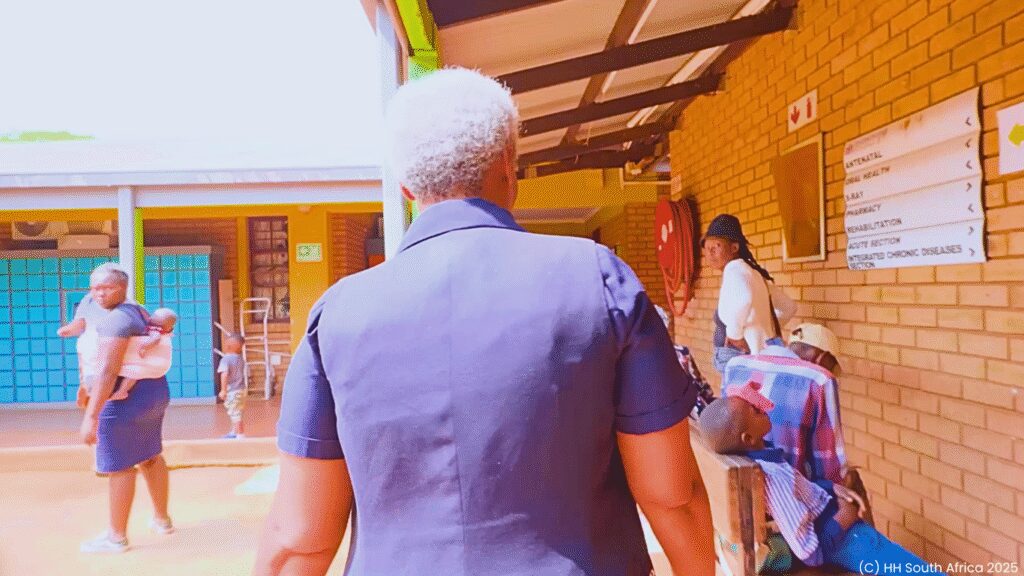“Physically, with all the sweating, after some time, maybe afternoon, I feel as if I’m smelling. I have that smell. I wish I can just go and have a shower, but I can’t because I’m still at work.“
Health Worker 1
For many health workers in South Africa, heat isn’t just a matter of discomfort. It’s a daily struggle, one that quietly shapes their performance, their well-being, and the lives they are entrusted to care for every day. In maternity wards across South Africa, the heat is rising, and so is the strain on those delivering care.
Listening to the Frontline: A Glimpse into Our New Study
In a new HIGH Horizons study, soon to be published, a team of researchers from Wits RHI working in collaboration with the London School of Hygiene and Tropical Medicine (LSHTM), Centre for Sexual Health and HIV AIDS Research (CeSHHAR), Karolinska Institutet (KI) and Technical University of Denmark (DTU) set out to uncover how rising temperatures are affecting health workers in maternal and neonatal facilities in the Tshwane region. They spoke directly with those on the frontlines, nurses, midwives, and support staff working in antenatal clinics, labour wards, and postnatal care units.
“I think their voices have not been heard, and we need to amplify their voices; we need to protect the health of mothers and newborns, but also importantly, we need to protect the health of those people who care for us, which are the health workers.”
Dr Pascalia Munyewende, Senior Researcher at Wits RHI and Social Scientist
What the Workers Told Us: “The Heat Affects Everything”
During the field research, the voices were clear and urgent. Extreme heat is not just a background condition; it is actively undermining the ability of health workers to care.

Some healthcare workers told the team that, “When it’s too hot, I struggle to concentrate.” “I just want to go in, do what I have to do, and get out.” These insights drive home the point that “heat affects everything.” Their testimonies revealed more than discomfort; they revealed a system under pressure and a workforce being pushed to its limits.
Our study reveals some of the key ways heat is affecting care on the ground. The top findings are highlighted below:
- Heat is undermining the quality of care in health facilities for pregnant and postpartum women, newborns, and children. Across labour and postnatal wards, workers described how high temperatures are impacting the quality of clinical care. Some admitted to rushing through procedures, skipping important counselling moments, or avoiding extended interactions with women and parents altogether, especially in rooms with no fans or windows.
“I just take the basics and move. You can’t even stand the heat, so how do you sit and explain?”
Health Worker 2
When the environment is oppressive, empathy suffers, and essential people-centred care is cut short.
- Communication becomes strained as the temperature rises throughout the day. Several health workers spoke about rising irritability among staff, with one describing how conversations between colleagues become shorter, sharper, and less collaborative as the heat builds through the day.
“Sometimes I snap… and I know it’s because I’m too hot and tired.”
Health Worker 3
In extreme heat, the emotional bandwidth to support women or each other shrinks. In one particularly poignant story, a worker described losing patience with a mother struggling to breastfeed.
“I wanted to shout, but I knew it wasn’t her fault. I was just exhausted.”
Health Worker 4
- The physical and mental health of health workers is at risk. Many staff members described signs of heat exhaustion: headaches, dizziness, difficulty concentrating, and emotional fatigue. Protective gear, designed for infection prevention, often made things worse. Workers wear thick uniforms with plastic coverings, sweating through 12-hour shifts without adequate ventilation or hydration breaks.
“By midday, my whole body is soaked. But you keep working. What choice do we have?”
Health Worker 5
The impact isn’t just physical. Several described a sense of detachment from their work, a numbness that creeps in with the heat, making care mechanical and emotionally distant.
- The built environment of many health care facilities is not designed for heat. Most clinics and hospitals were not designed for the temperatures we’re now seeing. Many maternity wards have sealed windows, locked doors (for newborn safety), and no functioning fans or cooling systems. Postnatal wards traditionally kept warm for babies are now dangerously hot, compounding risks for both mothers and infants.
What Needs to Change?
The findings are clear: frontline health workers are enduring conditions that are unsafe, unsustainable, and increasingly common. We need more climate-resilient health systems.

Interventions to protect health workers and pregnant and postpartum women, infants, and children could include:
- Functional windows and improved ventilation
- Low-carbon cooling technologies
- Seasonally- appropriate uniforms and Personal Protective Equipment (PPE)
- Access to clean water and scheduled hydration breaks
- Health policies that address heat stress in health facilities
But more than anything, we need political will and policy action. South Africa’s current National Climate Change Strategy does not mention health workers’ well-being and does not account for the day-to-day realities of working in climate-exposed health facilities.
This is Just the Beginning
Through this study, Dr Pascalia Munyewende and the team at Wits RHI hope to continue to explore how services can address heat stress in the health facilities, especially the delivery of maternal and newborn care.
Once the study is published, you will be among the first to find out. First, why not share this blog with a friend or colleague?
This is just one of many stories we’re uncovering. At HIGH Horizons, we’re working in countries in Africa and Europe to reshape how extreme heat is impacting maternal and child health from communities to hospital wards to policy rooms. As one health worker shared:
“All I’m thinking about at that point in time is just to get out of there… I will not even be having that patience to go there to teach; be patient with her.”
Health Worker 5
These voices matter. They’re shaping the future of climate-resilient health systems.
We invite you to stay connected:
- Read more on our website highhorizons.eu
- Join the conversation using #HeatMNCHealthConversations
- Follow us for the upcoming release of the full study and further research insights
Let’s make sure health workers are no longer left to sweat in silence.



